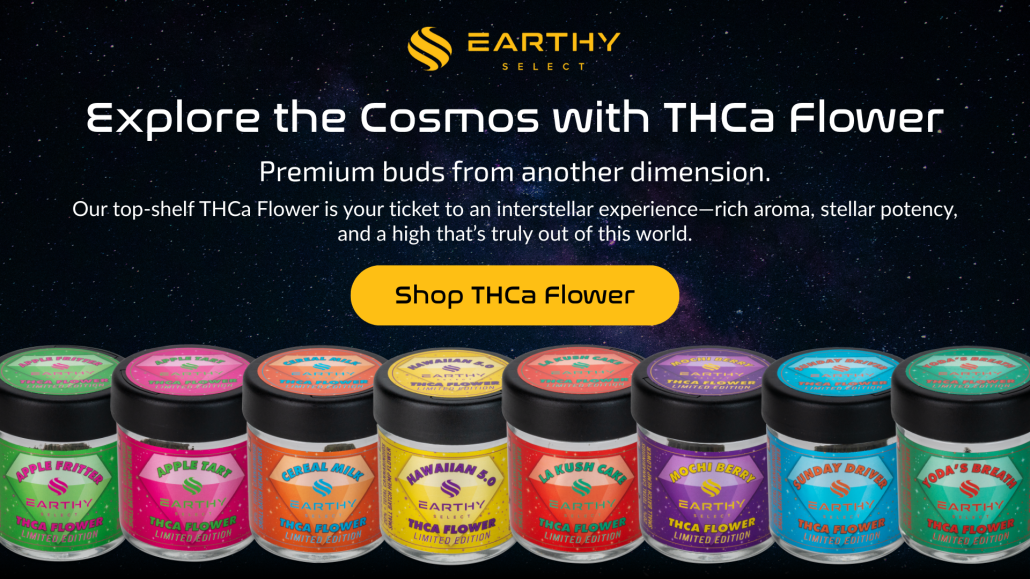Wisconsin’s Approach to THCa: Legal or Not?
Key Takeaways
- THCa’s legal status in Wisconsin appears ambiguous, influenced by federal hemp provisions under the 2018 Farm Bill and the state’s restrictive cannabis regulations.
- Earthy Select focuses on providing federally compliant THCa products, with an emphasis on thorough testing and organic growing practices.
- Proper storage and cautious use of THCa are advisable, considering its potential to transform into psychoactive THC under specific conditions.
As cannabis policies evolve across the country, many Wisconsin residents are seeking clarity on whether THCa—tetrahydrocannabinolic acid—falls within legal boundaries in the state. THCa, a non-intoxicating precursor to THC, may present an alternative in regions where marijuana remains prohibited, though its legal status often raises questions.
At Earthy Select, we prioritize transparency and adherence to regulations. Our focus is on THC products that align with federal standards, including premium THCa Hemp Flower sourced from family farms. Through meticulous lab testing and legal diligence, we aim to ensure safety and potency in compliance with the US Farm Bill, where permitted.
Wisconsin, however, upholds stringent cannabis laws with minimal medical access and no recreational allowance. The standing of THCa in the state remains unclear, particularly due to its capacity to become psychoactive when heated. This article will examine the scientific background, current state regulations, and how Earthy Select navigates this complex landscape to provide compliant, high-quality cannabis products. Let’s examine the details to help you understand the situation.
Learn more: What is THCa?
Wisconsin and THCa: Sorting Out the Legal Questions
Is THCa considered legal in Wisconsin? The situation is not entirely clear, stemming from the definitions of THCa vs Delta-9 THC. The 2018 Farm Bill permits hemp products with no more than 0.3% Delta-9 THC at the federal level, yet Wisconsin maintains stringent cannabis policies [1]. While THCa itself lacks psychoactive properties, its potential to convert to THC when heated places it in a questionable legal space.
Some interpretations suggest THCa may be permissible under state law if THC levels remain at or below the threshold, while others view its potential psychoactivity as a concern. Without specific guidance on THCa, Wisconsin residents face uncertainty and are advised to stay informed as policies develop.
The Current Status of THCa in Wisconsin
Is THCa regarded as legal in Wisconsin? The answer remains complex. Wisconsin enforces strict cannabis regulations, with recreational marijuana prohibited and medical access highly limited [2]. THCa, non-psychoactive until heated, occupies an uncertain legal position.
Under federal law, the 2018 Farm Bill permits hemp-derived products with no more than 0.3% Delta-9 THC [1]. THCa may fall within this definition, yet Wisconsin has not explicitly addressed THCa in its statutes. Consequently, some local authorities might view THCa products as permissible under hemp guidelines, while others could interpret them as a risk due to potential conversion to THC [3].
Given varying testing protocols and unclear regulations, the sale and use of THCa in Wisconsin carry potential risks. Until state lawmakers provide more precise guidance, THCa’s status appears to hover in a zone of uncertainty, with compliance not assured.
The Federal Farm Bill’s Role in Wisconsin THCa
The 2018 Farm Bill redefined federal hemp policy by legalizing hemp nationwide, provided it contains no more than 0.3% Delta-9 THC by dry weight [1]. For Wisconsin, this means THCa—a non-psychoactive hemp compound—could potentially fall within legal parameters, as long as Delta-9 THC levels remain within the federal limit. However, when exposed to heat, THCa transforms into THC, which is associated with psychoactive effects.
This ambiguity has led to varied interpretations across Wisconsin. Thus, certain local enforcement may consider THCa hemp flower permissible, while others approach it with caution due to its potential conversion to THC [3]. Although the Farm Bill provides a degree of federal protection for THCa products, Wisconsin’s state laws and enforcement perspectives create a less predictable environment. Until state regulations offer more clarity, THCa remains in a somewhat uncertain legal space in Wisconsin.
Comparing THCa, Delta-8, and Delta-9 in Wisconsin
When considering cannabis options in Wisconsin, it’s helpful to understand the distinctions between THCa, Delta-8, and Delta-9 THC in terms of chemistry and legal standing.
THCa serves as the raw, non-psychoactive precursor to THC. It does not produce psychoactive effects unless heated, converting to Delta-9 THC. Under the 2018 Farm Bill, THCa derived from hemp may fall into a legal gray area, though Wisconsin’s strict cannabis policies suggest potential risks remain [3].
Delta-8 THC, often derived from hemp-based CBD, is noted for producing a milder psychoactive effect. Its legal status appears uncertain; while it may be permissible under federal hemp guidelines, Wisconsin officials have raised concerns regarding safety and lack of oversight [4]. It’s available in some locations, though enforcement approaches can vary.
Delta-9 THC, the primary psychoactive component in marijuana, remains prohibited for recreational use in Wisconsin, with strict oversight even for minimal concentrations in hemp [2]. In summary, while THCa and Delta-8 may currently navigate through legal ambiguities, their use in Wisconsin carries inherent uncertainties. Being aware of these differences can help in making informed decisions while minimizing potential legal concerns.
THCa vs. Delta-9 Under Wisconsin Law
Wisconsin maintains a clear distinction in its regulations between Delta-9 THC, the psychoactive element in marijuana, and THCa, its non-psychoactive precursor. Delta-9 THC is classified as a Schedule I controlled substance and is strictly prohibited in the state. Possession, sale, or distribution may result in legal consequences, with no allowance for recreational or broad medical use beyond limited CBD products [2].
THCa, present in raw cannabis, does not produce psychoactive effects until heated, at which point it converts to Delta-9 THC. Wisconsin law does not explicitly address THCa but includes general restrictions on “tetrahydrocannabinols,” which could potentially encompass THCa, particularly if authorities suspect intent to convert it for use [3].
The federal 2018 Farm Bill permits hemp derivatives with no more than 0.3% Delta-9 THC, offering a potential allowance for hemp-derived THCa [1]. However, enforcement in Wisconsin varies, and possessing THCa may attract scrutiny, especially if it can be converted into illegal Delta-9 levels. Until clearer state guidance emerges, handling THCa products in Wisconsin involves a degree of caution.
Where Delta-8 Fits Into the Legal Puzzle
Delta-8 THC, a hemp-derived cannabinoid, exists in a somewhat ambiguous legal space in Wisconsin. Although sourced from federally permissible hemp, Delta-8 is typically produced through chemical processes, prompting concerns about legality and safety. Some suggest it aligns with the 0.3% Delta-9 THC limit under the 2018 Farm Bill, yet Wisconsin authorities have not officially endorsed it, and the state’s Department of Agriculture has expressed reservations [4]. In certain areas, local law enforcement has taken steps to limit Delta-8 sales, viewing it as impermissible if it exceeds THC thresholds or lacks regulation.
Overall, while Delta-8 may be available in some locations, its legal standing in Wisconsin remains uncertain and could face tighter restrictions or enforcement in the future. Until state policymakers provide definitive guidance, engaging with Delta-8 products carries potential legal considerations.
Safe Storage and Responsible Use of THCa
Handling THCa requires attention to proper storage and mindful usage, even though it lacks psychoactive properties until heated. Exposure to heat, light, or air might degrade THCa, potentially diminishing its quality or safety. It’s advisable to store THCa flower in a sealed, opaque glass container in a cool, dark environment, using humidity control packs to prevent mold growth. Such measures help maintain its integrity and protect your investment.
For raw consumption of THCa, such as in juices or smoothies, begin with small quantities. Research on its effects is still emerging, and individual responses can vary. If heating THCa to convert it to THC, exercise additional caution, as potency may differ based on the method, and THC’s effects could impact activities like driving or operating equipment.
Above all, ensure THCa is stored securely, out of reach of children and pets, to prevent accidental ingestion. Taking these precautions can support safe and responsible use.
Tips for Safe Consumption and Responsible THCa Use
Using THCa responsibly is essential, particularly in regions like Wisconsin where legal frameworks can be intricate. For those new to THCa, starting with a small amount and proceeding gradually is wise; when heated, THCa can convert to THC, and effects may vary depending on the product or method of use, allowing time for your body to adjust.
Opt for products from trusted sources that provide third-party lab results (COAs) to verify safety and potency. Whether smoking, vaping, or consuming edibles, note that inhalation offers quicker effects, while edibles may take longer to manifest—avoid increasing intake prematurely.
To preserve quality, store THCa in a cool, dark, airtight setting. Additionally, staying informed about local regulations and emerging research is beneficial, as both can shift. By remaining cautious and knowledgeable, THCa use can be approached with greater assurance.
Final Thoughts
The status of THCa in Wisconsin remains intricate, influenced by federal hemp provisions and more restrictive state policies. This creates a degree of uncertainty for consumers. Nonetheless, brands like Earthy Select remain committed to compliance, quality, and transparency. Our exotic THCa Flower, cultivated with care in California and Colorado, undergoes rigorous lab testing for safety and is distributed in accordance with federal standards. Although Wisconsin’s regulations may lack clarity, we strive to provide dependable THCa options, enabling you to explore possibilities with greater confidence.
Read more:
Frequently Asked Questions About Wisconsin’s Approach to THCa
Does THCa convert to THC when heated?
Yes, THCa can convert to THC—the compound associated with psychoactive effects—when exposed to heat through methods like smoking, vaping, or cooking. At Earthy Select, we provide this information transparently and offer lab-tested, federally compliant THCa Flower to ensure clarity on what you’re using.
Does Wisconsin have specific laws on THCa?
Wisconsin lacks explicit regulations directly concerning THCa. Marijuana remains prohibited in the state, though THCa derived from hemp with no more than 0.3% Delta-9 THC may align with the 2018 US Farm Bill [1]. However, enforcement varies locally, and legal certainty is not guaranteed [3]. Earthy Select’s products are designed to meet federal guidelines, although local considerations may still apply.
How do Wisconsin laws on THCa compare to other states?
Wisconsin enforces more restrictive cannabis policies compared to states like Colorado or Illinois. While some nearby states have embraced broader marijuana legalization, Wisconsin generally adheres to federal hemp guidelines with limited leniency [2]. Earthy Select ensures compliance with federal standards for added peace of mind.
Is there pending legislation about THCa in Wisconsin?
As of late 2025, no significant legislation specifically targeting THCa has been enacted in Wisconsin. However, recent proposals by Republican lawmakers suggest potential restrictions on hemp-derived THC products, which could affect THCa’s status [5]. Earthy Select remains vigilant in monitoring regulatory updates to ensure ongoing compliance.
Does Wisconsin have a medical cannabis program?
Wisconsin’s medical cannabis program is notably limited, primarily allowing low-THC CBD for specific conditions. THCa is not explicitly addressed [2]. Earthy Select offers federally compliant options that are consistent with current federal regulations.
What do Wisconsin residents think about the state’s current cannabis laws?
Many in Wisconsin appear to favor broader cannabis legalization and express frustration with the state’s gradual progress. Earthy Select offers lab-tested, hemp-derived THCa as a potential alternative within legal boundaries.
Medical Disclaimer / Legal Disclaimer – Information is provided for educational purposes only. It does not, and is not intended to, constitute legal advice or medical advice. We strive to be accurate and up-to-date, but the legality of cannabinoids and the science of cannabis are continually evolving. The author is neither a legal professional nor a medical expert. Before buying or using any products, you should consult with your local authorities and medical providers.
References:
- https://www.congress.gov/bill/115th-congress/house-bill/2
- https://docs.legis.wisconsin.gov/statutes/statutes/961
- https://hemphop.co/blogs/news/is-thca-legal-in-wisconsin-thca-wisconsin-law
- https://goldcbd.com/blogs/news/is-thca-legal-in-wisconsin
- https://mjbizdaily.com/wisconsin-republicans-want-to-ban-hemp-derived-thc-products/






